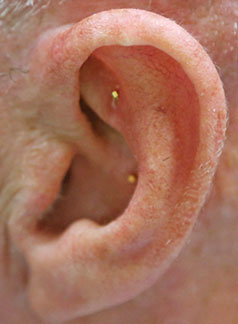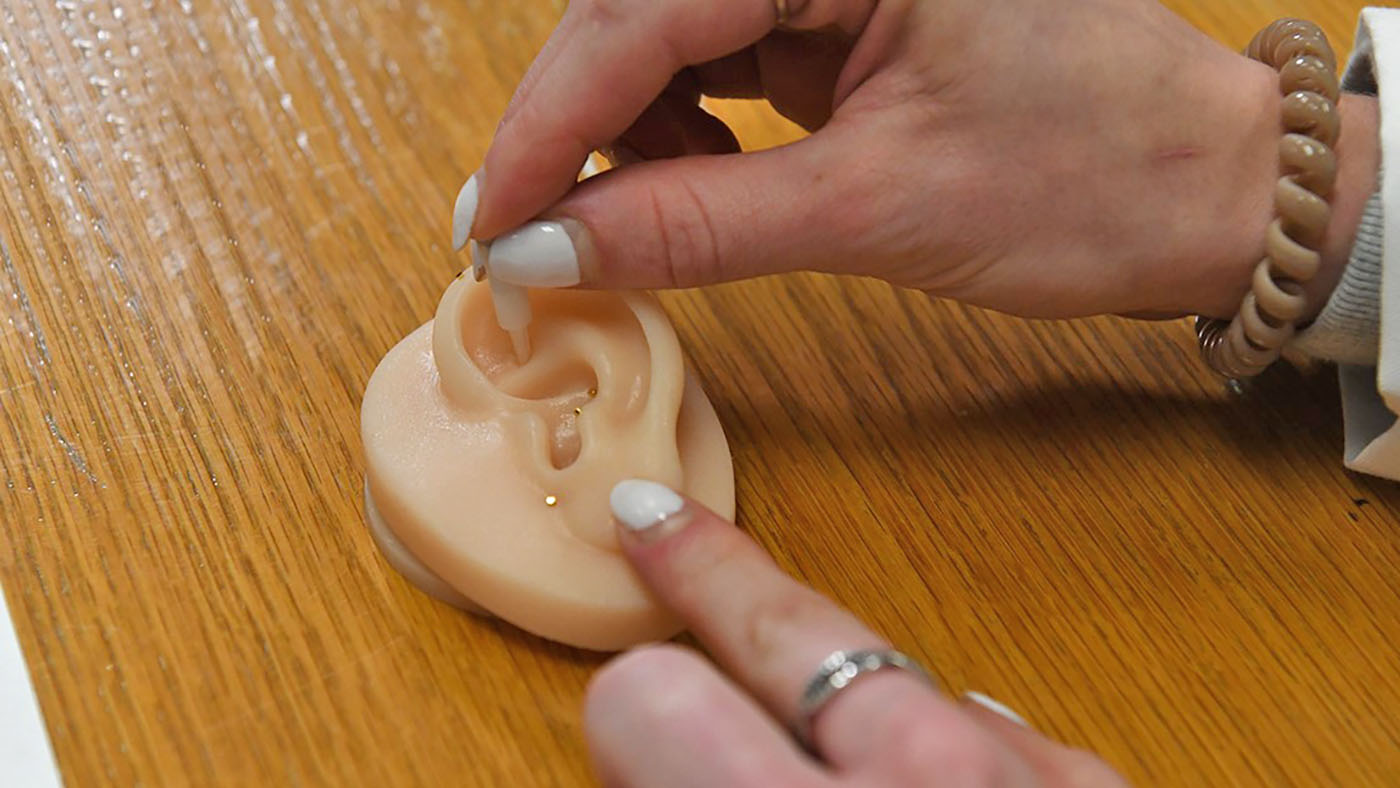A VA pharmacy program manager replaced opiates with acupuncture as alternative therapy to provide pain management treatments to Veterans without drugs.
For more than 75 years, VA has been at the forefront of innovations in health care—and teaching those innovations—to improve the quality of care for Veterans. From melding traditional learning with simulation lessons to virtual reality immersion experiences to non-pharmaceutical treatments for chronic pain, VA innovations create safer, more effective care for Veterans and training for the next generation of highly skilled health professionals.
Pain management treatment outside the prescription bottle
Health care innovations are not always new treatments or new technologies. Instead, they may involve unexpected providers utilizing long-standing methods to meet their patients’ needs. While acupuncture is thousands of years old, it was incorporated by medics and corpsmen during the Vietnam War to help wounded service members manage pain.

Courtney Jason Givens, mental health and pain clinical pharmacy program manager at the North Texas VA in Dallas, recognized the need for non-pharmaceutical pain management options while working in a VA mental health clinic. That’s when she became interested in alternative therapies and VA’s whole health approach to managing chronic pain. She went on to become certified in battlefield acupuncture and now works daily with the pain management team providing both pharmacological management and acupuncture.
“For many of those Veterans, opiates were not an option because they had co-occurring substance use disorder. It was too risky to use an opiate. I wanted to find a way I could contribute something else to their treatment plan to get them to their goals,” she shared.
Battlefield acupuncture—also known as auricular acupuncture—is a non-invasive procedure that uses small gold needles strategically placed on five points of each ear to relieve pain throughout the body. This application of acupuncture was first discovered in 2001 by Dr. Richard Niemtzow (USAF retired). He determined that by applying acupuncture techniques to specific points on the ear, pain could rapidly be relieved for soldiers on the battlefield. This treatment option was quickly adopted by the military and later VA as a highly effective way to relieve pain both on and off the battlefield.
Pharmacy students and residents can learn and become licensed in battlefield acupuncture as an alternative to medications in pain management.
“Everything changed in terms of their pain.”
Givens has incorporated battlefield acupuncture into the pain treatment plans of many of her patients with much success. “When we were able to utilize battlefield acupuncture for them, everything changed in terms of their pain. I was happy to incorporate this into my practice.”
VA’s relentless work in health care research and training continues to innovate care for Veterans and the nation. VA conducts its training programs for more than 113,000 health professions trainees annually in affiliation with over 1,400 educational institutions across the country, including 99% of the nation’s medical colleges.
These academic affiliations, some of which began more than 75 years ago, are coordinated by VA’s Office of Academic Affiliations (OAA).
Find out more about VA’s academic mission by watching this video and visiting the Office of Academic Affiliations website.
Topics in this story
Link Disclaimer
This page includes links to other websites outside our control and jurisdiction. VA is not responsible for the privacy practices or the content of non-VA Web sites. We encourage you to review the privacy policy or terms and conditions of those sites to fully understand what information is collected and how it is used.
More Stories
Veteran Byron Potier weighed almost 300 pounds and was tired and lethargic. He was the perfect candidate for gastric sleeve surgery.
How much do you know about VA care, benefits and services? Don’t miss out on what you've earned—check out the "2025 VA Federal Benefits Guide for Veterans, Dependents, Survivors, and Caregivers" handbook to learn more.
Feeling stressed? Your breath can help you relax and focus. Take 3 minutes to reset and prioritize your well being for this week's #LiveWholeHealth practice.







Although there is some support for auricular therapy in general, the evidence base for BFA is relatively meager.2,4 Regardless, the Defense and Veterans Center for Integrative Pain Management and the Veterans Health Administration National Pain Management Program Office recently completed a 3-yr $5.4 million acupuncture education and training program, which deployed certified BFA trainers to receptive Department of Defense and Veterans Administration medical centers.
Please add this corollary experience to your excellent pain article.
I recently had major abdominal surgery, exploring for cancerous areas in connection with some problematic colonoscopies – none found, thankfully. (Done at Raymond Murphy VA hospital in Albuquerque NM.)
But the recovery pain and period were as usual for that procedure; not pleasant. I did notice that the staff use of opiates was at a minimum during my hospital post-op, and that I was sent home with nothing but Tylenol and pain mitigation instructions. Of course I had access to telephone help and concerned staff at all times.
But at no time was I steered toward becoming the ‘next generation’ of fentanyl addicts foisted on an unprepared society.
So, common sense can also be a factor
In pain management. Thank you, VA medics.
I just had my 3rd session. Prefer it over opiates for pain.
I’d love to get this treatment done for my neck pain! DC VA medical center referring patients for out in town ? Or in the hospital?
This is wonderful to read, alternatives to dangerous and addictive drugs. How might we include our FSS/VA Award Contract in an online feature such as this? We want Veterans to know there are alternatives to treating chronic pain, with proven results.
We look forward to hearing from you, thank you